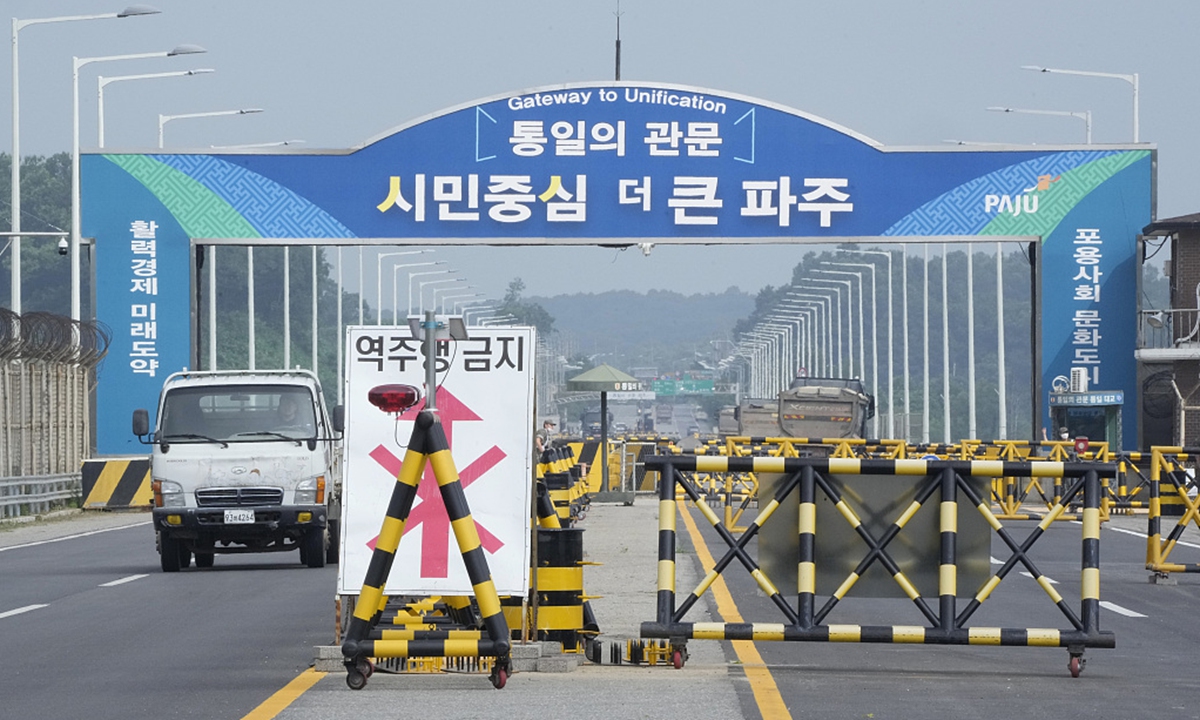
Photo: VCG
Two rare news stories occurred on the Korean Peninsula Tuesday. For the first time in 42 years, a US Navy nuclear ballistic missile submarine has made a port call in South Korea. On the same day, a US soldier crossed into North Korea "willfully and without authorization." Behind the seemingly coincidence is a new round of escalating tensions on the peninsula.
Kurt Campbell, the White House Indo-Pacific coordinator, told reporters in Seoul on Tuesday, "As we speak, an American nuclear submarine is making port in Busan today. That's the first visit of (an) American nuclear submarine in decades." Reports show it is an Ohio-class nuclear ballistic missile submarine, which can carry a maximum of 20 Trident II ballistic missiles. "Each Trident missile can carry four nuclear warheads, meaning each US ballistic missile submarine could be carrying about 80 nuclear warheads," CNN reported on Tuesday.
A few years after the historic handshake between leaders of the US and North Korea, the sitting US president Joe Biden is showing his different approach toward the Korean Peninsula. He repudiated his predecessor's policy, and prefers coercive diplomacy when dealing with Pyongyang in an attempt to reach "denuclearization of the peninsula." This is mission impossible. The approach only shows the Biden administration does not want to ease tension in the region, but rather do the opposite, said Lü Chao, an expert on the Korean Peninsula issue at the Liaoning Academy of Social Sciences.
By deploying a nuclear submarine, Washington is also using the Korean Peninsula issue as a lever to boost its Indo-Pacific Strategy, strengthening its regional alliance and military cooperation, aiming at not only North Korea, but also China and Russia, Song Zhongping, a Chinese military expert and TV commentator, told the Global Times.
The port call "reflects the United States' ironclad commitment to the Republic of Korea for our extended deterrence guarantee," the US military said in a statement on Tuesday. What a hypocritical way of saying it. In truth, the port call is simply an endorsement, a commendatory gesture for South Korea President Yoon Suk-yeol, as the latter has sacrificed so much of South Korea's national interests in pursuit of pro-US, pro-Japan and pro-NATO policies. Since Yoon took office, South Korea has been pleasing the US by irritating China and Russia with no good reason, favoring Japan with no bottom line, and recklessly provoking North Korea.
The US offers little in return. For instance, what South Korea really wants, like a nuclear-sharing deal, is unlikely to come true. All Washington could provide Seoul is a gesture of appeasement, such as sending a nuclear submarine. And it works for the Yoon administration, which, sadly, has not yet realized that South Korea is in a dangerous gamble, facing distrust from neighboring countries and escalating hostility on the peninsula.
On the same day, an American soldier, at the time of his rotation in South Korea and reportedly facing disciplinary action, fled across the demarcation line into North Korea on Tuesday. It must be an embarrassment for the US.
Yet what US media sees is a different story. Fox News underlined that "North Korea detains US soldier," and quoted former CIA station chief Dan Hoffman as claiming, "Now North Korea has another piece of leverage that they can use against us and we know from the past that they have used US persons as pawns to gain traction and negotiations with the United States."
The current US North Korea strategy is filled with sanctions, pressure and coercion. Sending a US Navy nuclear ballistic missile submarine is one of US' well calculated plans to flex its muscles. That story, which aims to display Washington's military power, was ironically shadowed by the news of its own soldier who fled to the other side of the 38th parallel.

